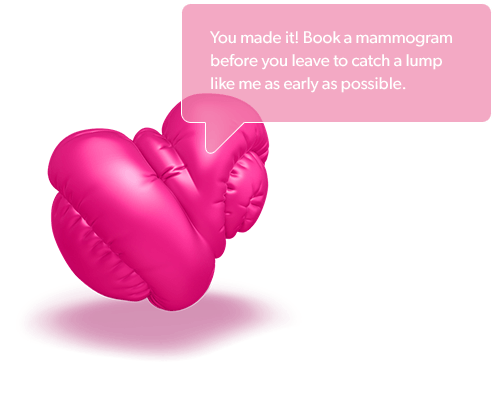A mammogram is a safe, low-dose x-ray
Women have a 95% chance of surviving breast cancer five years or longer if the cancer is detected by a mammogram. Because the risk of breast cancer increases as you get older, the NZBCF recommends women consider having regular screening from age 40.
Book a mammogram
BreastScreen Aotearoa is New Zealand's National Breast Screening Programme. They provide free mammograms every two years for eligible women 45 - 69 years.
Book your mammogram with BreastScreen Aotearoa!
Freephone 0800 270 200
Having a mammogram
A screening mammogram is an x-ray of the breasts and is used to detect breast cancer before it shows any signs or symptoms. Early detection can reduce the chance of dying from breast cancer by approximately one third, as small, early cancers are easier to treat. Screen-detected cancers are also more likely to be treated without having to completely remove the breast.
Checked your breasts lately?
We'll show you how. Checking your breasts is easy as TLC. 'Know your normal', so you can find any changes in your breasts as soon as they appear.
-
Touch
Touch both breasts. You’re feeling for any lumps or thickening of the tissue, even up into the armpits. -
Look
Look in front of a mirror. Can you see any physical changes to the breast shape, skin or nipples? -
Check
Check any breast changes with your doctor. Even if you’ve had a mammogram recently.
Real signs of breast cancer
Do you have…?
Real images courtesy of Scottish GovernmentFAQs
Risk factors
Reduce your breast cancer risk
There are some risk factors that you can change. It’s important for you to understand these, as it may help you make some risk-reducing lifestyle changes. You can then also talk with your doctor about the surveillance and screening that is appropriate for you.
Risk factors we can’t change
Unfortunately, you have no control over these risk factors. It’s still important to be aware of them, so you can talk to your doctor about the surveillance and screening you need.
Factors that don’t cause breast cancer
Heard the rumour that your deodorant could give you breast cancer? Thankfully, it’s just a rumour. Read up on more breast cancer myths, and whether there’s evidence behind any of them.
Inherited Risk
Hereditary or inherited breast cancer can develop because of a gene mutation (alteration) that has been passed down from a parent.
It’s less common than most people think – only 5-10% of all breast cancers are hereditary. Around 8 out of 10 women who get breast cancer don’t have any family history of the disease. Most breast cancers are sporadic, which means they occurred by chance or due to factors other than an inherited mutation.
Should you be tested?
If you have breast or ovarian cancer in your family, you might need to be referred for genetic testing. Find out what your level of inherited risk is.
Inherited risk FAQs
Everything you need to know about breast cancer in families.
Your family risk
If you have a confirmed cancer-causing genetic mutation, you may want to discuss these risk-reducing options with your doctor.
We’re here to help
If you’ve got questions about your breast health, get in touch.





